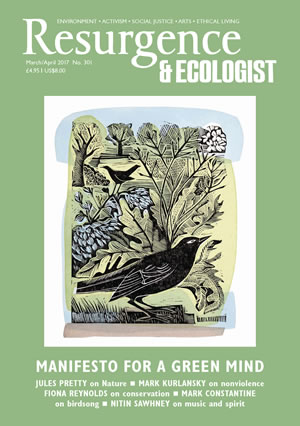Over the last century, conventional commerce and industry has been responsible for much of our present environmental and social crisis. This mainstream business approach is born out of a flawed logic about how the world works. Fortunately, it is a logic that is being challenged by a growing number of forward-thinking businesspeople.
Ray Anderson, one of America’s leading modern business thinkers, summed up the position clearly: “We have been, and still are, in the grips of a flawed view of reality – a flawed paradigm, a flawed worldview – and it pervades our culture, putting us on a biological collision course with collapse.” And Paul Polman, the chief executive of Unilever, has demanded that business leaders snap out of old thinking about how the world works and move to a new model, a new logic, where the interconnectedness of business, society and the environment is seen as core to purpose-driven enterprise.
There is little doubt that our prevailing business logic not only alienates and undermines the majority of its employees through hierarchic control-based thinking, but also degrades our communities and more-than-human world through its myopic short-termism and self-centred greedy intent. Yet there is a new paradigm emerging in business, which goes beyond mere ‘greenwashing’ PR fluff. It is embracing a new worldview: a living-systems worldview for business, with huge implications for us all.
In Issue 300 of Resurgence & Ecologist (January/February 2017), Fritjof Capra outlined a living-systems view of life in his article We’re All in This Together. Evidence now points to a groundswell of forward-thinking leaders grasping the nettle of what this interconnected-systems view of life means for the most powerful organised force of human innovation and transformation on this planet: business. This can only be good news for us, our communities and the wider fabric of life on Earth.
I have interviewed a number of leading thinkers such as Fritjof Capra, along with a variety of senior business leaders, and I have been heartened to find that many in business are patently aware of the now desperate need for a radically different approach to how we organise and operate. While business-as-usual is very much part of today’s problem, business-unusual is becoming an important part of creating our future – a future we all desire, a future that tends towards harmony with life.
For instance, when I asked the CEO of a global chemicals company what their most pressing challenge was, the reply was that it was the need to transform the psyche of the company to one that embraces ecosystemic thinking, whereby social and environmental drivers are ingrained in day-to-day decision-making. For the CEO of a professional services firm, it was transforming their world of work in a way that enables everyone to bring their ‘whole selves’ to work, so that the organisation becomes more purposeful, vibrant, connected and altogether more human.
More and more of our business leaders are waking up to the realisation that our organisations are actually living systems rather than machines, and that these living systems are intimately entwined with the living systems of society and our more-than-human world. And for these organisational living systems to thrive in times of increasing uncertainty and volatility, they need to learn to become regenerative.
What do we mean by ‘regenerative business’?
Regenerative business seeks to create the conditions conducive for life, by operating in ways that contribute, replenish and evolve within the evolution of life: business that is not just copying living systems logic, but deeply embodying this logic of life, by seeking harmony within the rhythms, flows and evolutionary currents of life.
It is a strategic intent to serve life; a purposeful mindset that guides our journey.
This mindset can be characterised as a shift from an overly mechanistic and materialistic perspective of the world rooted in separation, self-maximisation, fear and control, towards a realisation of the interconnectedness of life.
The control-based characteristics of conventional business separate the work functions from the management functions, creating silo mentality and a hierarchic bureaucracy that relies on a control-and-predict ethos of managing remotely by numbers. The organisation is perceived as a self-maximising machine struggling for survival in a dog-eat-dog world. This hyper-competitive reductionism applies a neo-Darwinian logic that is failing us.
The future of business, by contrast, displays the characteristics of living, vibrant, resilient systems.
Adaptive teams are empowered to make change happen at the local level, to self-organise and locally attune amid an ever-changing environment. Leaders do not manage remotely through hierarchy, but rather facilitate environments where learning, co-creativity and authenticity flourish. Decision-making is not hierarchic, but distributed. The goal is to deliver upon the purpose of the organisation. In doing so, a healthy profit follows. The organisation is viewed as a purpose-driven community, intimately interwoven within the living systems of our wider world. Nothing is separate from anything else: everything is interconnected.
This logic is the logic of how life really is. And it is simply good business sense, as hot-off-the-press research from The Global LAMP Index shows that organisations embracing this regenerative logic consistently outperform their mechanistic counterparts.
Let’s take a look at life through the lens of organisational and leadership development to explore this ‘regenerative business’ logic.
Living systems need a blend of divergence and convergence to thrive amid volatility.
Divergence is achieved through
• Including a diversity of perspectives from different people within and beyond the organisational boundaries (brought about through generative dialogue approaches);
• Empowering self-organising teams adapting to their local circumstances, freed from cumbersome bureaucracy and control-based hierarchy (facilitated through self-management team dynamics); and
• Encouraging the emergence of new ideas from all the workers in a company or institution, nourished by a participatory and exploratory cultural mindset. It is a ‘bottom-up’ model rather than a ‘top-down’ one.
Here are some examples of this approach:
Impact Hub, the global network of social-enterprise community centres, has “check-ins” at the beginning and end of every meeting, for people to centre themselves and share in authentic and purposeful ways.
A North American waste company regularly holds stakeholder dialogue sessions with a diverse group of stakeholders to ensure that customers, suppliers, local activists, Indigenous people and community leaders are all involved in generative discussions about the strategy of the organisation.
A London supermarket, Thornton’s Budgens, holds “sharing circles” every few weeks for all employees, regardless of their role, so that problems transform through empathy into improved ways of working. This helps the organisation deliver on its purpose of putting people and planet first, trusting that profit will follow, while creating a more vibrant workplace for everyone.
Convergence is achieved through
• Having a life-affirming, resonant sense of purpose and clear strategic intent that guides and governs the overarching direction of travel; and
• Creating a soul-based culture that underpins and infuses the day-to-day meeting conventions, management protocols and behavioural values of the company or institution.
Again, here are some examples of this approach:
The European financial services provider Triodos makes money work for positive social, environmental and cultural change by investing in projects that enrich our world. All of Triodos’s investment projects are open to public scrutiny, with the social and environmental credentials of every investment available online.
The chemicals company Pantheon Enterprises applies ‘conscious chemistry’ to ensure that all its products are biodegradable and non-toxic. It is committed to changing the chemical industry for the better through its approach. As a culture, it encourages its staff to become more empowered by engendering self-organised methods of management and decision-making.
The legal services provider IACP’s boardroom considers the impact all its decisions have on the next generation – our children – ensuring that services to corporate and domestic clients transform conflict into breakthrough resolutions.
In such a new model of business, the ‘divergence’ provides the vibrancy, creativity and effectiveness, while the ‘convergence’ provides the mission-driven intent and soulful purpose of the organisation. Both together provide the aliveness, agility and purposefulness for the living system to thrive amid volatility. This coherence within the organisation informs the way it relates with its ecosystem of stakeholders, including wider society and the environment.
This tension of divergence and convergence is what leaders across all levels of the organisation need to be conscious of, so as to allow value creation and delivery to flourish amid this tension. It becomes an art: an artful mastery of creating the conditions conducive for life to flourish within our organisations, while adapting to ever-changing circumstances.
Regenerative, life-affirming business is not a utopian dream: it is how life really is. It is our prevalent practices that are a deluding aberration. It’s fallacy to think we need to be singularly at odds with life. As the Greek philosopher Zeno said, the purpose of life is to live in agreement with Nature.
We are waking up to the reality that the fundamental purpose of business is ultimately to serve life by creating the conditions conducive for it to flourish within and beyond our organisations. This is the emerging future we can all choose to participate in, beyond the worn out ‘us-versus-them’ blame game.
It’s not about being ‘holier than thou’, but rather about embracing our foibles and failings, learning and sharing as we go, creating safe space for learning to become more human in our more-than-human world, and having fun along the way.
Purposeful work can enliven and enrich us – we all know this in our hearts. It is not rocket science. Certainly there are some complexities, and equally certainly it may need facilitation and coaching help. But essentially this is about learning to respect our own selves, respect each other, and respect life. As Leonardo da Vinci is said to have put it, learn how to see, and realise that everything connects to everything else.








